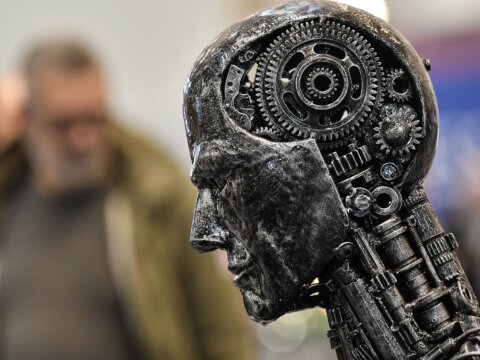Tag: technology
iPadOS 17 Amplifies Stage Manager’s Functionality, Yet A Few Elements Still Fall Short
Apple introduced Stage Manager last year, an effort to cater to iPad users seeking a desktop-like, multi-window experience. While the Stage Manager’s debut provided this feature, it did so with notable limitations. With the advent of iPadOS 17, Stage Manager has shown significant improvement, although certain aspects leave room for longing.
Harnessing Tech to Safeguard the Amazon: Indigenous Youths Take Charge
In Brazil, where her grandfather once protected native Amazonian lands with bows and arrows, Txai Surui, now uses tech as her weapon of choice. Txai, a 26-year-old Brazilian, is among the standout participants of the Web Summit Rio, the world’s largest annual technology conference. Not only an indigenous activist, Txai is the coordinator of the Kaninde Ethno-Environmental Defense Association, which represents 21 Amazon Indigenous peoples. Txai also produced the National Geographic documentary “The Territory”, continuing her parents’ legacy of activism. She speaks out of the double-edged nature of technology, “technology can also be used for evil.”
From Stone Tools to Silicon Valley Part III: The Technology We Use Today and the Future of Technology
From Stone Tools to Silicon Valley: An Anthropological Perspective on the Evolution of Technology. Part III: The Technology We Use Today and the Future of Technology. The advancements in technology have made life more convenient and have revolutionized the way we live and work. From smartphones to artificial intelligence, the technology we use today has brought many positive changes in our lives. However, there are also growing concerns over the impact of technology on society and the potential risks of its continued development.
From Stone Tools to Silicon Valley — Part II: Tech Boom and Exponential Growth
As technology continued to evolve, it brought about a radical transformation in human society. The late 20th and early 21st centuries saw an explosion in technological innovation, as computing power and digital communication capabilities advanced at an exponential rate. In the 1970s, the invention of the microprocessor paved the way for personal computers, which eventually gave rise to the World Wide Web, and the Internet as we know it today.
“The Human Side of Tech: Exploring How People Shape Technology”
Technology has been evolving at a breakneck pace over the past few decades, and it’s interesting to consider how the human brain has shaped this evolution. Technology and the brain share several common features and characteristics in many ways, and by exploring these similarities, we can gain a deeper understanding of both.
Pennsylvania County Accuses Tech Giants of Fueling Youth Mental Health Crisis
A Pennsylvania county has filed a lawsuit against social media companies, claiming their platforms have contributed to a youth mental health crisis through addictive technology and harmful targeted content. The Bucks County commissioners and the district attorney jointly filed the lawsuit in a California federal court on March 14 against parent companies of tech giants such as Meta Platforms Inc., Alphabet Inc., TikTok owner ByteDance Ltd., Snap Inc. and their affiliated groups.
How to Use the Internet for Senior Citizens: a Collection of the Internet Patrol’s Best Tips
Here are our best tips for how to use the Internet for seniors, including tips on Zoom, Facebook, Amazon, online doctors, and more!
Is Pink Tech Really a Problem or Just Not a Solution?
Every once in a while the issues around so-called ‘pink tech’ are revisited. Pink tech is basically when a piece of technology – say a smartphone or a laptop, etc. – is brought out in a pink color, to appeal to girls and women. The issue, says critics of pink tech, is that rather than attending to the actual technology needs of women, they are simply bringing out the same old tech in a new color. We’re not so sure.
Apple Fingerprint Recognition Scanner Technology on the iPhone Already Cracked – But Does it Really Matter?
Mere days after Apple released the iPhone 5s, with its new “Touch ID” fingerprint identity sensor scanner, the Chaos Computer Club announced that it had “successfully bypassed the biometric security of Apple’s TouchID using easy everyday means”. But does this mean the fingerprint recognition technology is useless? We say not.
Technology, Social Media, and the Boston Marathon Bombing
The Boston Marathon bombing, like most tragedies, has prompted countless reflections and questions; some of this soul-searching has been quite general – how is humanity capable of both ruinous evil and heroic good? – and some of it is quite specific – how many people where injured, who are they, exactly how did they get hurt? The much-discussed topic of how technology and social media have impacted the response to the Boston Marathon killings is both general and specific. It is general in that people are asking expansive questions about what role, if any, amateurs armed with computers and an internet connection should play in an active terrorist investigation, and it is specific in that, regardless of how you answer the first question, amateurs are playing a role in an active terrorist investigation, zeroing in on the minutest details of the thousands of photos of the crime scene floating around the internet. We’ll attempt to navigate between the two poles, exploring the intersection of technology, social media, and the Boston Marathon bombing details that have emerged so far.
Facebook Defends Their Facial Recognition Technology to the Senate Judiciary Committee’s Subcommittee on Privacy, Technology and the Law
Facebook is certainly no stranger to defending its practices, especially when those practices threaten the privacy of their users. Now they are finding themselves, yet again, in a position to have to do so. Facebook employees had to defend the social media giant’s facial recognition technology, which is used to help users tag people in their online Facebook photos. While Facebook maintains that its purpose is to provide a better consumer experience, some feel that it raises privacy issues.












